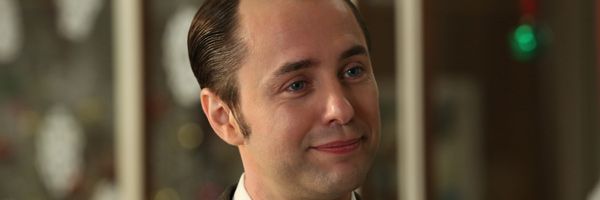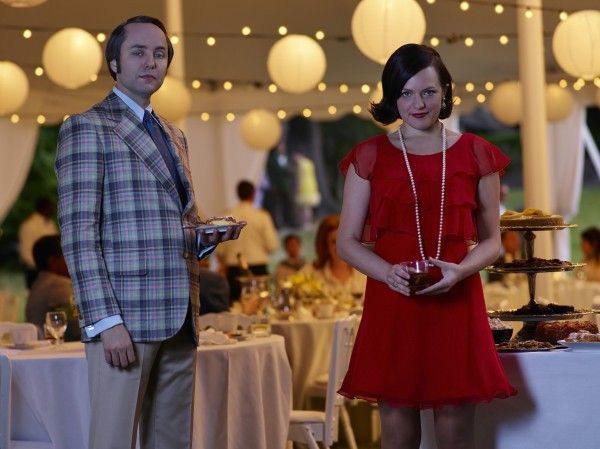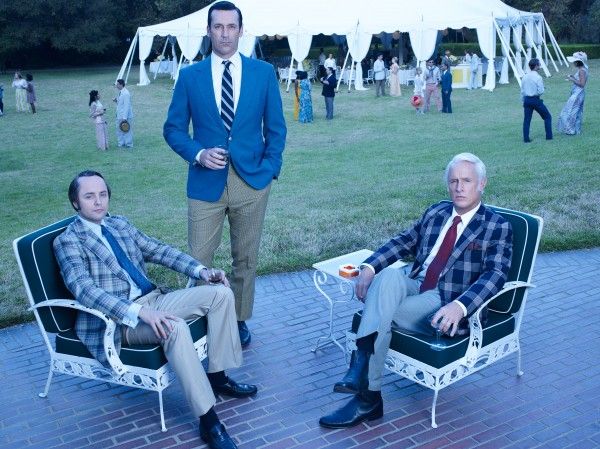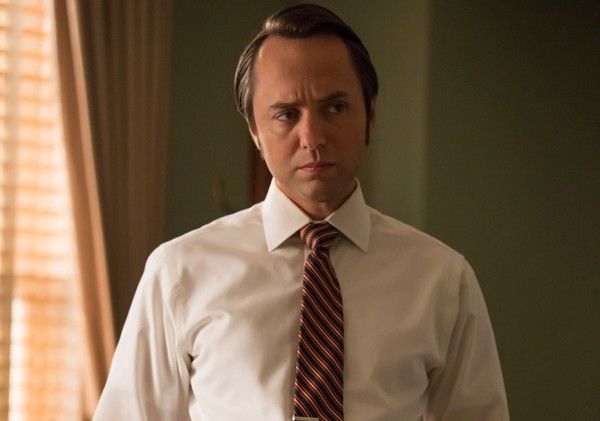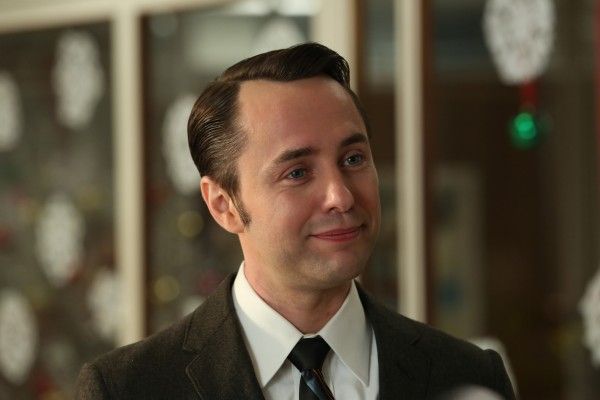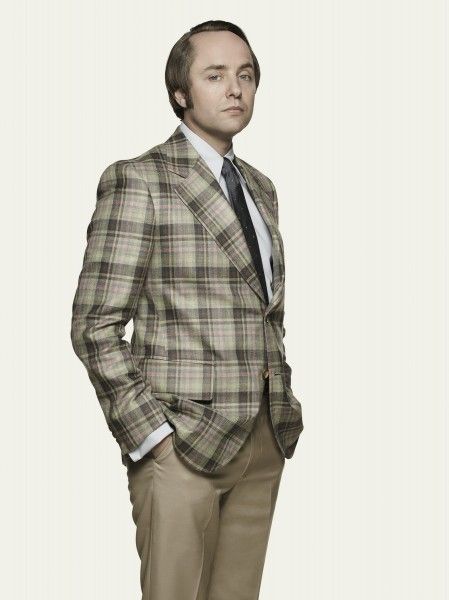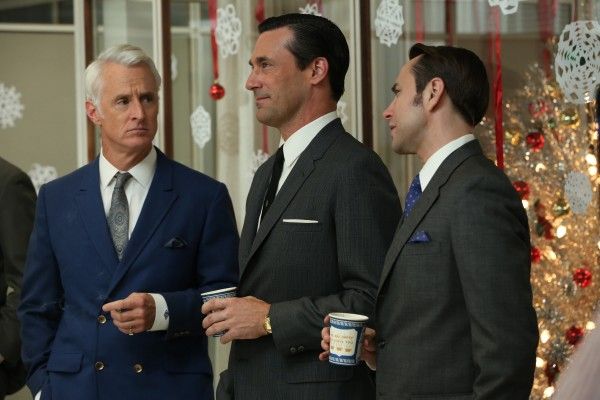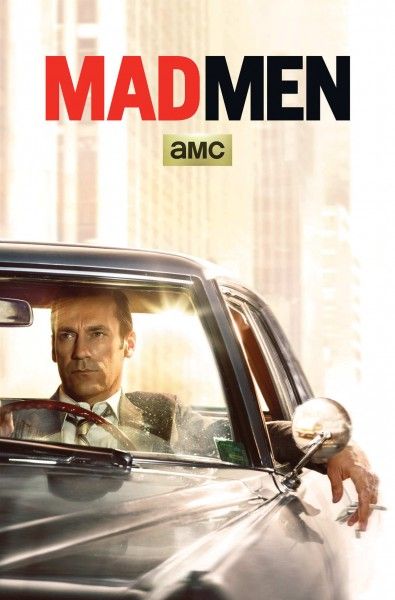With AMC’s Mad Men returning for its final seven episodes starting Sunday night, I recently participated in a roundtable interview with Vincent Kartheiser (who plays Pete Campbell). During the interview he talked about being part of such a special show, what he remembers about his very first day of filming, what he came to love about Pete over the years, if scripts ever went through radical changes, his thoughts on the various fan theories, and a lot more.
Finally, as someone that watches a lot of television, I’m extremely sad to say goodbye to the world that Matthew Weiner shaped. Creating great TV is hard. The team that brought Mad Men to life made it look easy. You will be missed.
Question: You finished filming last summer?
VINCENT KARTHEISER: Yeah.
So what’s it been like having been on one of the best shows and looking back – you’re promoting and the last season’s about to start.
KARTHEISER: Well, it’s been quiet, it’s been, you know, it’s been different. Usually we’ve gone on hiatus for a few months anyway, but right about now we’d be going back to work. So now is when it starts to feel a little bit strange. And promoting the last season, it’s bittersweet. But lots of you guys have been covering this for years and there’s nothing really left to say about it, at least from my perspective. The show has spoken for itself – but it’s bittersweet, you know?
Did you immediately start reading new scripts, auditioning? How did that process go?
KARTHEISER: Well even when we were working we were always reading scripts, you know, you’re always looking for your next job, so that never really stopped.
Is there any sense of relief that this part of your life is over and it’s time to move on?
KARTHEISER: No, I wouldn’t say relief. There’s no relief – it was a great job and I was with great people. So I wasn’t relieved that it was done. But I’m glad we made it tip the end. I’m glad we got a chance to do seven seasons and Matt got a chance to get to the point he wanted to in his career, the storyline.
But are you at least relieved you don’t have to shave your hairline anymore?
KARTHEISER: [laughs] Maybe! Maybe that was a little bit tedious toward the end. But no, overall, I still miss that. That was just part of the job and there were so many positive and wonderful things about the job that it’s hard to kind of take any part away from it.
Do you remember your very first day day on the set of Mad Men?
KARTHEISER: Yeah. Yeah, I do remember it, we were shooting in New York, and we were in an office building with a brand new floor they had ripped out to be Sterling Cooper Draper Pryce. And yeah, I do remember that. [very long pause] I don’t know, what do you want me to say about it?
Well, did you have any sense that this would be a long term, and really, iconic, kind of gig? Or was it just like, “Let’s see if this works!”
KARTHEISER: I don’t think anyone thinks, this is going to be iconic, or at least I didn’t. And we hoped it would be a long term gig, but most of us were like, there wasn’t really anything like that on TV. So most of us thought, “Well this is great, but how are they going to market that?” How are they going to get people to this channel, how are people going to stay interested with no murders or sci fi elements, and you know, I think the public really surprised us and our audience was really rabid for our next episodes. So we were all surprised by it but I don’t think in the beginning we would have seen that, this level of interest.
When did you get a sense that you guys had really pervaded the popular culture?
KARTHEISER: Um, I don’t know. I don't know if I ever did get the sense that we did pervade the popular culture. I think we affected a certain group of the culture. I still think – I think in New York and LA we definitely were part of the popular culture. I still think there are a lot of people to find out about Mad Men and watch Mad Men. That’s what I realize when I’m out and about in the country and talking to people. People say, “Oh yeah, I’ve heard of that! I should check it out.”
You mentioned the murders and the aliens, what do you remember about the material that was available at the time you were auditioning for Mad Men? What made this show so different?
KARTHEISER: This is different than anything that has ever been on TV, and I guess that’s a bit of a broad statement because everything has some differences, but this was so wildly different than other things. What was going on that year? Heroes was coming out – I don’t know, I think Lost had made a splash so everyone was trying to do that sort of thing. I don’t know, I never really read a lot of TV shows, but there was always great stuff on HBO and the Sopranos had just finished and Six Feet Under, so there was still interesting stuff on TV, it just wasn’t – it didn’t have this pace.
There was an anecdote in one of the magazine profiles that came out about the end of the show about how Matt kind of, at the last table read had an underwhelming ending and then people said, “Is that it?” and then he called certain people into his office and said what was really happening…
KARTHEISER: Yeah and we knew there was more, and it said something like, “Scene to be added later” so people knew that wasn’t the ending, they knew that there was more scenes and at least one more scene. And then just about ten or fifteen of us who’d been – I guess in Matt’s eyes, sort of primary to the telling of the story, he brought to his office and showed us parts of what he was going to do. And it was cool.
Has it been hard to keep the ending a secret? Have you told your wife or your friends, anyone close to you what happens?
KARTHEISER: No, I haven’t told anyone. No one really wants to know. They want to be surprised. And it’s not hard to not tell people.
What have been your favorite Pete Campbell moments over the years?
KARTHEISER: Oh I don’t know. It all just melds into one big story to me. it’s hard to remember what came in what season or, you know, I don’t have a great memory, so. I like them all.
What did you come to love about Pete over the years? What about him made you root for him?
KARTHEISER: I was always rooting for Pete. Even when he was doing atrocious things, I understood that he didn’t think they were atrocious and he had a method to his madness and there was a reason why he did those things. I never really thought he was a terrible person, I thought he made some poor choices. I always liked him though. And he was fun to play. He definitely was a spoiled little brat for most of the seasons. And that was kind of fun to play.
Do you feel that he evolved?
KARTHEISER: Sure. I think all the characters evolved. But more importantly they stayed who they were. Which is kind of what we all do, you know. What’s the line Matt always said? “People change, but not for that long” - and it’s true. I think there were changes and he did evolve and he did learn. But that core character, his core personality was pretty similar.
I’m very curious about any big changes – a lot of times with TV you’ll get a script and then there will be radical changes or revisions. Was there ever a time on the show where things really radically changed with the script?
KARTHEISER: Not really in relation to me. By the time I got the scripts, which was the day before we started shooting – I know other cast members saw scripts earlier and knew about storylines earlier, but I never did. So he would always make sure, and the writers would always make sure that they waited until the last minute until the script was pretty much in its final state. Because they didn’t want people – they didn’t want to change a scene and have people say, “I liked that scene, why didn’t we keep it that way?” I think they really wanted – they really wanted to present it as a unified front and say, “This is what we want to do.” There were always changes in the scenes and maybe the biggest change you’d have is someone else would have a line instead of you. Or they’d give a line to someone else after they heard the table read and say, “That isn’t really like your character, it’s more like this character.” But mostly, storyline, with the events that happened, that never changed in the scripts as far as I saw. I’m sure in the writers’ room, there were drastic changes, but by the time it trickled down to me it was pretty much in its final state.
How does this set the bar for what you do next?
KARTHEISER: I try to not let it unfortunately. Because it’s like anything really, you can’t compare any job or any friendship or anything to another. I think if you do, it’s kind of a recipe for disaster.
Mad Men has been what lots of people love to watch, what shows are you hooked on?
KARTHEISER: Oh, Game of Thrones, Silicon Valley, House of Cards. We watch all those shows.
What was your last day on set like?
KARTHEISER: Like all the other days, really. I just showed up and worked, you know. I try not to subscribe to too much sentimentality. It’s just not an emotion that I find to be very worthwhile. I don’t know, it doesn’t serve me. I just showed up and did my work, high fived people, and left before anyone got too sappy.
Were there people who took it visibly harder?
KARTHEISER: I wouldn’t know. it’s not my place to talk about anything like that and I kind of stayed out of everyone’s business. I’m sure there were, but I wouldn’t know.
So no one was crying on set?
KARTHEISER: I wouldn’t know.
What fascinates you most about the American 60s?
KARTHEISER: [chuckles] Um, really how it wasn’t that long ago. And how much shifted in that decade. How much radical change there was, and growth in the psychology of this country, in the social norms – how much they shifted. I think that was really interesting. The changes in the women’s movement. If you take 1959 to 1969, it’s radical, the shift that was available for women in the workplace. The position that women who stayed at home considered themselves to be in shifted drastically. That’s probably the most interesting thing to me, but I don’t know much about it. I’m just an actor. Just a stupid actor.
You mentioned you’re not sentimental and didn’t go through those things on the last day of set, but I’m curious what you “borrowed” that day to keep and take home?
KARTHEISER: Nothing.
Really?
KARTHEISER: Nothing. No, I don’t steal from sets.
Well maybe someone donated something to you?
KARTHEISER: No, there was no donation. I just went home like I always do, empty handed.
If you could describe the finale in one word, what would that be?
KARTHEISER: I don’t remember, it to be honest with you.
You don’t remember how the series ends?
KARTHEISER: I do remember how some story lines end, but like I said, for me it all becomes one big story. I don’t know which parts happened three episodes before that or what happened on the episode.
Okay, so how would you describe Pete’s storyline wrapping up in one word?
KARTHEISER: Um… spoiler. You know, to give anything like that so close to the deadline would be a real kick in the teeth to people who have fought so hard.
During season 5 there was an enormous amount of speculation online that Pete was going to be the character who died. There were various and supposed clues in the show. Were you aware of that and wondering what the heck people were seeing?
KARTHEISER: I mean it’s always nice to know people are watching and having their own ideas about things and it’s nice when your audience starts trying to guess what’s going to happen, it means they’re really interested. So that was nice and the fact that they wanted me to die or Pete to die, you know, that probably means that our viewing audience is in a healthy place.
Did you particularly enjoy any of the conspiracy theories that you’ve read? Like there was one saying that Megan was going to get murdered by the Manson family, or…
KARTHEISER: No, I didn’t really enjoy any of them, but it was nice to see that people had them. We didn’t spend too much time thinking about that stuff. You spend all day on set, it’s not like you go home and google that stuff. No, you spend all day with these things.
It is fascinating though that people can read so much into it though.
KARTHEISER: Oh it’s nice to think that, that people are dedicating their imagination to it, it’s a great sign.
Is Mad Men a funny set and who are the funniest and pranksters?
KARTHEISER: I don’t think anyone was a prankster, but Jon Hamm is hilarious, John Slattery, Elisabeth, January Jones is hilarious. Very very funny people. I mean Jon Hamm is like – he has a memory like a steel lockbox, so he remembers full comedy albums. It’s really quite brilliant. But Jon’s hilarious and watching him and Slattery kind of kick back and forth with jokes and voices and characters that they had throughout the years created, just through being good buddies – they were probably the funniest.
With the learning or growth experience you gained on Mad Men, what was the biggest thing you learned that you’ll walk away with from this experience?
KARTHEISER: Huh. I think I learned a lot about acting from the people I worked with. And I think I learned a lot about on-set behavior and how to be a part of a team, and I think that’s probably what I learned.
Is there appreciation at this point for how the show changed television?
KARTHEISER: I don’t know if it did.
It absolutely did!
KARTHEISER: Well see, you’re the expert. I don’t really study television or how things do or don’t change. So I don’t know anything about that. I’m just a stupid actor. I really am. They literally put a piece of tape on the ground and that’s where I stand. And then they give me a page full of words, and those are the words I say.
So there’s not this “holy shit this was amazing” feeling?
KARTHEISER: No, I’m from the midwest, that would come across as vain. I’m serious. I mean, we don’t live in that. that’s for everyone else. We just show up and do our work. All the hoopla around it is great, it’s wonderful that that happened. But it’s not something that interests me. I think television is always changing, right? it’s always shifting. And there’s been a lot of great shows before Mad Men and there will be a lot of great shows now, there are a lot of great shows now. I don’t know if Mad Men was a part of a great generation of television but I don’t think it was the pinnacle, I don’t look at it that way, I look at it that we were one of many great shows.
I’m curious when you look at from when you first started to when you guys wrapped, how did making the show change?
KARTHEISER: It didn’t change.
I mean was it always eight day weeks, can you talk about that change?
KARTHEISER: Well we added more days, it took more money as the show went on and the cast of characters grew. The time it took to do things got a lot longer. But it was just – there’s a lot more attention to detail because there were so many more people and so many more story lines we had to make sure we did it right. And I think Matt also had the first couple of seasons written in his mind before we started so as we went on we had to make sure that - he wanted to make sure - he kept the show at a high level. So that meant him working longer and longer hours and staying up later and a lot of pressure was put on him. So in that sense the show definitely did become a completely different thing. When we started it was like ten little crew and bam bam bam we’d shoot the scenes out. And then you know, our crew got huge and our cast got huge. As the time went on too, it wasn’t that simple – the fashions changed and the hair, there was a variety of hair going on on set so that took more time as well. So yeah. It did change a lot. It felt like a totally different show.
Did you meet any self professed “real life Petes” going along? People who came up and said, “I was like him” and “I did that back then”?
KARTHEISER: Yeah, no one really said that, but people said like, “I was account manager” or – we pretty much got two responses to that. People would say, “It was exactly like that” or “It was nothing like that.” And we decided that it was basically people who was privy to what was going on and people who weren’t. And I guess every advertising house was a little different.
Were you able to use anything from encounters of people who lived it?
KARTHEISER: No, not really. We had such a team of writers and experts and a group of people combing thorough history and finding great stories, great moments and great campaigns that we didn’t really need to reference outside of that. And they were vetting everything and making sure that it was true to life.
Do you think about going back to TV after this or would it have to be something really special?
KARTHEISER: We all gotta eat.
Are there individual scenes or lines that hang with you or people often come up to you and mention to you?
KARTHEISER: People never come up to me. It’s the blessing of being Pete Campbell and not Roger Sterling. It’s funny, I went to a bar with Roger… I just called him Roger Sterling – I went to a bar with John Slattery in New York and it was me and our makeup artist, this was about four months ago. And all night long a steady stream of people walking up to him. And I was sitting right next to him and no one ever said anything to me. They just don’t recognize me. And so I don’t know what people liked or don’t like – but I liked a couple things he said. "Not great, Bob!"

